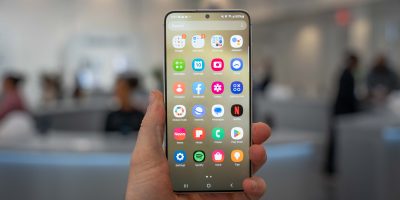
The UK’s Office of Fair Trading has a bone to pick with so-called ‘freemium’ apps targeted at children. It’s no secret that more than a few parents have been shocked to find a massive bill after leaving their kids to their own devices, mommy or daddy’s smartphone in hand. The OFT is now looking into the possibility that youngsters are being “unfairly pressured or encouraged to pay for additional content,” or in some cases simply duped.
While the specific companies under fire were not revealed, Google will at least be a part of the investigation, as is Apple. Both host such freemium content in their respective mobile app stores. If the OFT determines that there indeed is something fishy going on with apps like Zombies vs Ninja — in one case a five-year old racked up a £1,700 bill in 15 minutes playing the game — the whole process would move to the next phase, which could include legal action.
The OFT is hoping the investigation alone will be enough to get to the bottom of what is going on and reach a better understanding of how developers and content stores like Google Play are leveraging freemium content. We’ll keep a close eye on this one, as it could have a very real impact on the ways developers can monetize their games.
[via TechCrunch]










About time. We need this to be done in usa. None of the kids app should have that ability.
What qualifies as a “kid’s app”? My kids play Temple Run and Candy Crush, just like many adults. I will say that Google and the device manufacturers really don’t make it obvious that you can set up a PIN. If I didn’t visit these forums, I wouldn’t know about it. It’s also set up per device, and not per google account, so if you have multiple devices on one account, you have to do them separately.
” I will say that Google and the device manufacturers really don’t make it obvious that you can set up a PIN.” From the Play Store Settings: “Require PIN before purchasing apps or other content”. How does it need to be more obvious?
Pardon me, but if you use a pin for app purchases in Google Play, doesn’t it apply for in-app purchases as well? I think it does, as in-app purchases take you to Google Play to buy the packs. So why blame Google or game companies if you aren’t responsable enough to protect your device and leave it to the kids
Exactly, this parent was too lazy to take the time to properly set up the device and thus should have to pay whatever bill the kid racked up
I totally agree that parents are the problem when it comes to in app purchases but I think investigation is a welcome thing here to ensure that nobody is circumventing payment authorisation and also I would like to see clearer cost for fermium games. Everyone knows they are not free really so I’d like to know upfront how much I am likely to have to pay for a good experience in a game. So a label something like “This game is free but to complete the game in app purchases will cost from $10 to $17000” would be a good start.
I can here to say the exact same thing. Yes the PIN does also apply to In-App purchases, and for each and every purchase, unlike the 15 minute window that iOS has after entering your password..
Not everybody reads Android sites. I had a few spare minutes the other day and tried to find this PIN thing on my N7 and couldn’t. No setting I saw in Play or the system settings. If anyone wants to call me stupid for this, go ahead if that makes you feel smarter and better about yourself. And yeah I’m a dev with 20 phones flashing multiple new ROMs every week and I’m sure another minute or 2 or some quick Googling will get me the info. (And yeah I must be an awful dev because I didn’t have a piece of trivia already memorized, right ?)
My 10 yo son bought Minecraft without permission. I contacted them and had the order cancelled. I think most reputable companies would do the same. I personally cancel any order for my apps on request. Out of 12,000 sales I’ve had about 100-200 cancels, mostly for compatibility reasons. Only one identified themselves as a parent and it was over a month after purchase.
Well, you got me there. If you don’t bother checking the basic settings of an app you use, then I’m speechless. It’s not a hidden option, it’s in plain sight, you just got to access settings menu.
On an unmodified Galaxy Note II, the settings menu for Google Play says “Set or change PIN, Create a PIN to prevent changes in user controls”. It doesn’t say anything about billing.
I’m sorry, that isn’t good enough for a problem that is affecting many users. Go UK, put some pressure on. Google should be forced to go to the trouble to change the UI so the first time you open Google Play on a new device, or log on to the website, it says right there in a pop-up window “We suggest entering a PIN that must be input for any purchase made on Google Play that will charge your credit card” (and optionally free apps as well), and have a No Thanks Button and an Enter PIN button. When the PIN is set, Google should send an email to your Google Email account. Simple. They should have already done this.
Oh, come on, it’s not rocket science, right on top of set pin option, there’s a grayed option that says: Use PIN for purchases/Require PIN before purchasing apps or other content. You didn’t see that either? I think it’s pretty obvious
Gray text on black background is not obvious to me. I think Google could do a better job. I know you are satisfied.
Huh? It’s pretty obvious why it’s gray –here’s no point clicking on it until you have set a PIN. You have to set a PIN first before it becomes enabled.
There’s already password protection on in-app billing, so I don’t think it’s Google who have fallen short here. Most of the horror stories seem to involve Apple’s app store, and to have to do with the 15-minute window when there is no password protection on that system. They frequently also involve a few specific apps, which invites the suspicion that those apps are cynically exploiting the 15-minute window.
I think app developers who want to protect their reputation could put in measures to prevent young children from spending silly amounts of money on silly things like in-game power-ups. It wouldn’t be too hard, for instance, to have a confirmation dialogue box pop up if more than a certain amount of purchases were made in a certain time, and design that dialog to involve a type-in response which a young child would not be able to complete.
Well I did, but you know what ? For some crazy reason I didn’t see the PIN settings. I dunno why. Whatever, LOL. :)
I’ll try to redeem my shattered reputation a bit by noting that using the Menu key was required. Menu-> Settings-> Go down a page, then Set or Change PIN.
Google has been trying to discourage use of the Menu key, because many average users don’t think to try it. So why doesn’t Play have a toolbar like Google recommends for other devs ?
This is ridiculous. Just another excuse to have somebody parent our children for us.
I thought those app require you sign in with your Paypal? Uk kids know their parents account???
If it’s password protected then there’s no way this is on Google. Keep your password private. This is because bratty kids pester their parents for the passwords and the parents, in an attempt to make the kid shut up, give it to them. Kids are smart. They usually don’t “accidentally” make in app purchases
Not entirely true, I fell foul of an inadvertant in-app purchase even though my eldest was too young to read properly at the time. He was simply clicking the most attractive buttons instead of playing the game and didn’t realise what he was doing. Fortunately I caught him before he did much damage.
I now have a PIN set to prevent any future purchases.
Google play has pin and password protection for purchases. If parents are too stupid to lock play store purchases they cannot blame other people to do so
This isn’t about protecting devices or accounts, this is about whether any apps break the law. It is against the law in the UK to use “direct exhortations” (i.e. strong encouragement) to get children or get children to get their parents to purchase something.
Putting a clown on a pack of cigarettes is “Direct Exhortation” making a game fun to appeal to its target audience is called “Marketing”.
I guess the investigation will find out where the line between the two is
Instead of letting kids use their phones buy a kid friendly tablet or phone. Blame Google for bad parent skills is wrong. The parents should be held responsible for their kids actions especially if they give their passwords up just to shut their kids up.
Why I hate IAP as much as the next, This is 80% a case of bad parenting as 90% of the IAP take you to the app store, which you can have a password entered each time something is purchased. Some older games still use in house IAP that is not password protectable (that a word?). Though IAP is a bane to games, give me a $5 quality game any day over a free quality game with in app purchases a a difficulty curve to match.
Don’t hand over your device to your child if you don’t know how to adequately secure it.
Here we go again, but glad to see its not just the US doing this kind of crap. Parent’s can’t parent their children so they want the government to step in and sue someone. Christ, if you’re worried about it don’t give your kids a cell phone when they’re too young to know wtf they’re doing. Or, I don’t know, block purchases on the phone?
The OFT is an independent (of government) body responsible for consumer protection. The issue here is not about kids running up huge bills but whether some game producers are breaking the law. It is illegal to dupe or pressure sell to children. This investigation will work out if that is what is happening here with some ‘Freemium’ games.
The fault exists with the device owner/bill payer. Technology exists to prevent these purchases from being made use it. I ask this question every time I need to clean up my cafe after a band of kids tear it up. At what point does your child stop being your responsibility and it becomes my problem? Blaming Google -again – is just misguided. here’s an idea, take some personal responsibility for a change and stop making things difficult for the rest of us. Even better, stop patronizing these “Freemium” games altogether force them to make a great complete product that’s worth it the first time.
Service Providers allow you tp block online purchases complete and it costs you nothing to sign up
shut up gay spammer
How do you know he’s happy?